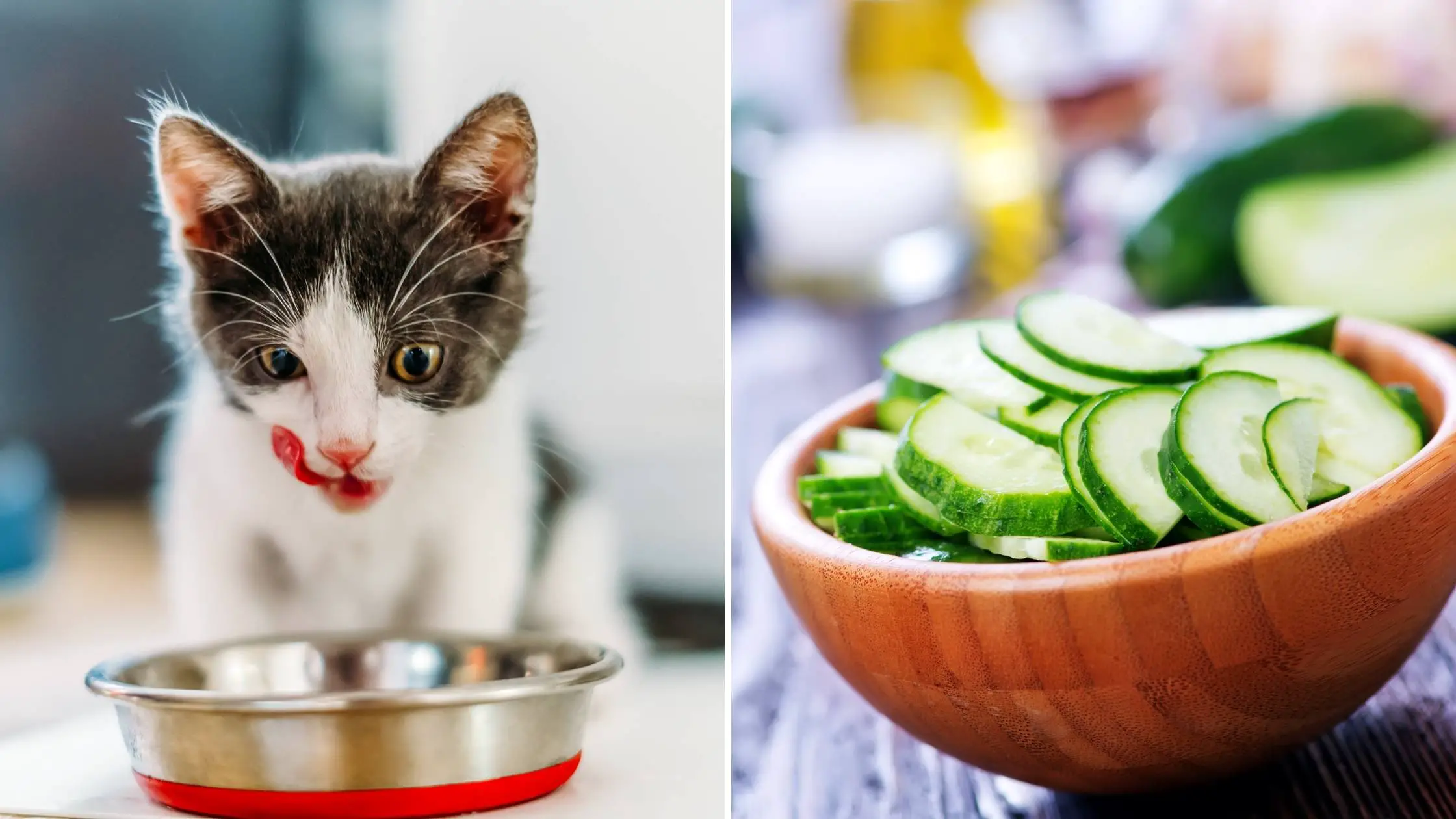Last Updated on 05/25/2021 by Veronica Jones
Does your feline friend show a keen interest every time you are in the kitchen chopping cucumber? Should you share your healthy green snack with a kitty? Can cats eat cucumbers? Let’s find out…
Can cats eat cucumbers?
Yes, cats can safely nibble on the odd bit of cucumber. Cucumbers are an excellent source of vitamin K and also contain healthy nutrients such as beta-carotene, copper, potassium and manganese. But like any fruit, too much of a good thing can be bad. There are also some precautions that you need to take before your kitty starts tucking into a slice.
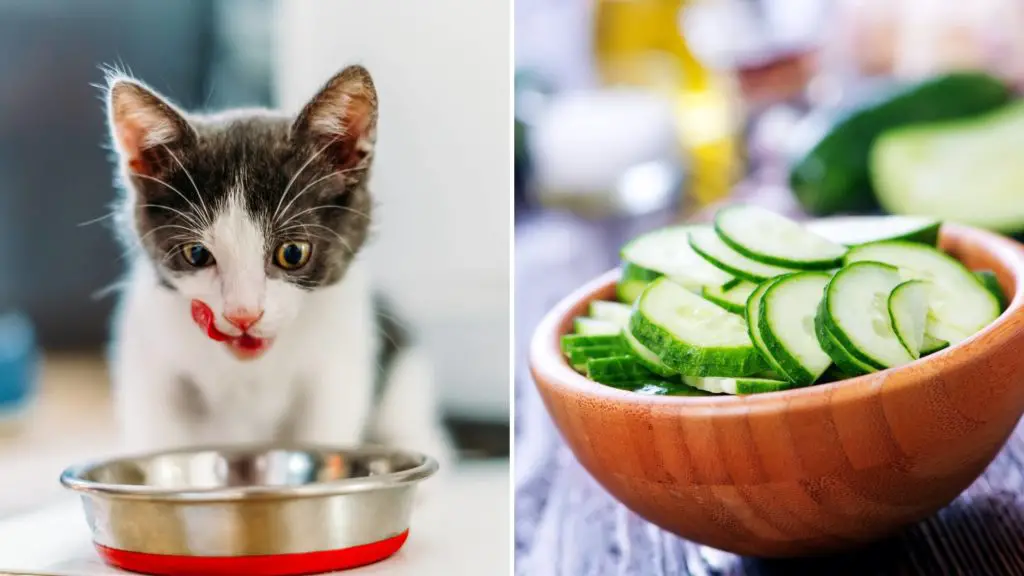
Are cucumbers good for cats?
There are various health benefits of a cat eating cucumber, including:
Helping felines stay hydrated: cucumber is 96% water, which is a great source of moisture for cats especially during the hot summer months.
An excellent source of vitamin K: this important vitamin maintains the blood’s clotting ability and helps a cat’s liver function well.
Lots of minerals: cucumbers contain copper, potassium and manganese, which all contribute to good health in cats.
- Copper helps absorb iron into the body.
- Potassium is an important electrolyte that supports the normal function of muscles and nerves.
- Manganese helps kitties to build strong bones and cartilage.
- Molybdenum helps a cat’s metabolism and digestive system.
Cucumbers are low in calories: at eight calories per one-half a cup, cucumber is a great treat for an overweight cat.
Even though cucumbers are rich in goodness, you should still only give them to your kitty once in a while as a casual treat.
Are cucumbers bad for cats?
The skin of a cucumber is difficult for a cat to digest and should be peeled first. The skin may also contain poisonous pesticides that could harm your kitty even after washing it, therefore it’s best to take it off before serving to your feline friend.
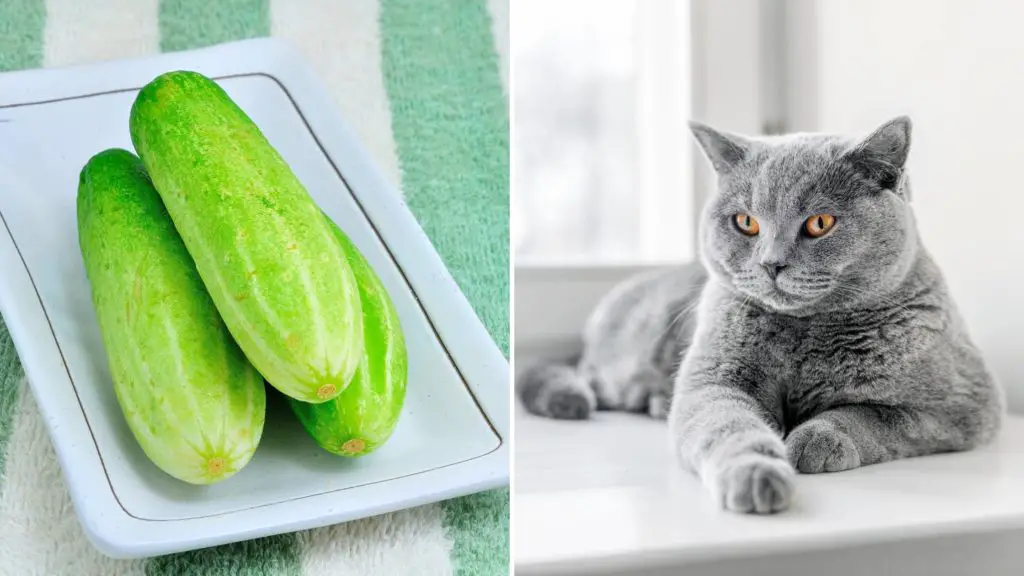
Here are a few side effects that your cat may experience from eating too much cucumber.
Diarrhea: the high water content of cucumbers means that eating too many slices of it could cause a nasty case of diarrhea for your furry friend.
Allergies: before giving your cat any new food, you should only give them a small dose to start with. If your kitty develops allergic reaction symptoms such as itchy skin, red eyes, diarrhea or vomiting then contact your vet for advice.
Seasoned cucumbers: as humans, we love to add some salt or dressing to our foods to enhance their taste. It’s important to never share your seasoned cucumber snack with your kitty as they often contain ingredients such as onion that can cause hemolytic anemia in cats.
Cucumbers are not suitable for felines who have kidney disease. This is because the potassium in cucumbers won’t be filtered and excreted effectively by the kidneys, causing potassium to remain in your cat’s blood and cause hyperkalemia.
Can kittens eat cucumbers?
Yes, but not straight away.
At eight weeks old, your kitten will start to be weaned off its mother’s milk and begin eating solid foods. At this stage, a special diet of wet or dry food will be introduced that contains the nutritional needs for a kitten.
It can take between four and six weeks for cats to be weaned properly, so you shouldn’t try to introduce any other new foods during this time.
Young kitties develop the most in their first year, so a balanced diet is essential for growth.
After the weaning process is complete you can begin to start introducing new foods such as fruits and vegetables to your feline, after you’ve checked with your vet.
Cats don’t need vegetables like humans do to stay healthy. Adopt a less is more approach when it comes to giving your furry friend some cucumber. You should always cut cucumber up into small pieces to avoid a choking hazard.
Do cats like cucumbers?
Do cats eat cucumbers? Cats are suspicious creatures and naturally curious, so even though they don’t need vegetables in their diet, some may have a taste for them.
Felines can’t taste sweet flavors, however they can taste sour, bitter and salty flavors well.
Recommended Article: Can Cats Eat Whipped Cream?
How to safely give cucumber to your cat
Wash and peel the cucumber and cut it up into bite-sized pieces before serving to your kitty. Avoid giving your pet pickled cucumber as this will add dangerous levels of salt to the vegetable. Plus if you use a pickling liquid, it may contain garlic which is poisonous for cats.
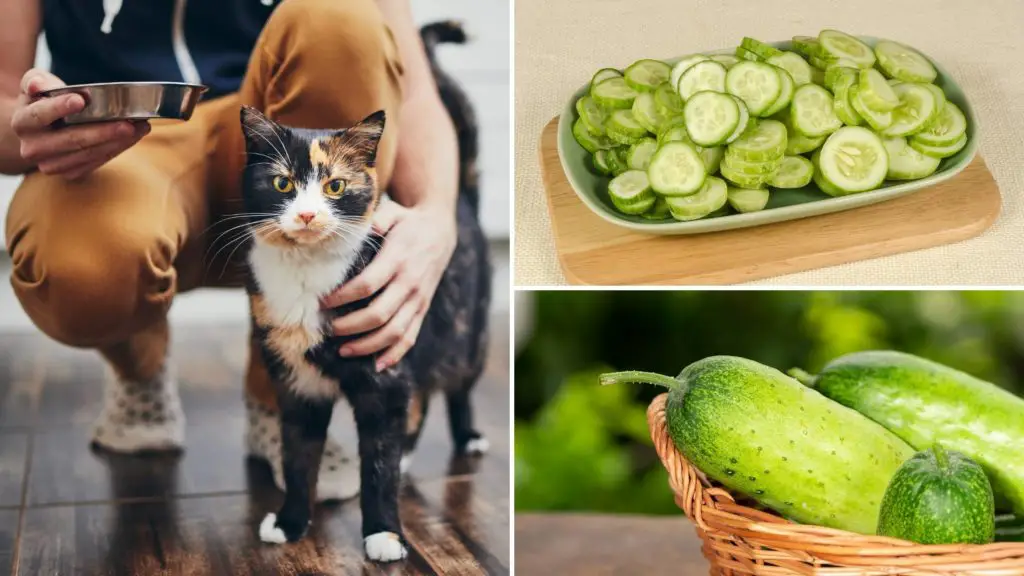
Why you shouldn’t put a cucumber by your cat
Cats have a fear of the unknown. When an unfamiliar object is placed next to them without them noticing, they can get scared and jump. Videos of cats afraid of cucumbers are all over the internet, but you should never try it with your kitty. Here’s why:
- Scaring your pet isn’t good for their health. Causing unnecessary stress can lead to many physical symptoms such as diarrhea, vomiting, bald patches, sores, runny nose and eyes, as well as behavioral symptoms like scratching furniture, urinating on items around the home and excessive meowing.
- You may cause them to injure themselves from trying to jump away from the cucumber.
There are a few theories about why cats are frightened of cucumbers, including that they may remind felines of snakes or simply that the sudden appearance of a cucumber is what startles them.
What other vegetables can cats eat?
Can cats eat vegetables and fruit? As a carnivore, a cat’s diet should be mainly protein-based. Kitties don’t actually need fruits and vegetables to stay healthy, however they do make a better alternative to high-calorie pet treats.
You can share the following fruits and vegetables with your feline friend:
- Steamed asparagus
- Cooked carrots
- Bananas
- Blueberries
- Steamed carrots
- Cooked butternut squash
- Steamed broccoli or green beans
- Melon
- Peas
- Pumpkin
- Spinach
Are cucumber leaves safe for cats?
The leaves of food plants such as cucumbers, tomatoes, strawberries and rhubarb should not be consumed by cats. Contact with the leaves may cause itching and blistering of the mouth and gums, as well as sneezing and eye problems.
If you have any food plants growing in your garden, it’s best to cover them with a net to stop your feline friend from coming into contact with, or consuming, anything that could cause them harm.
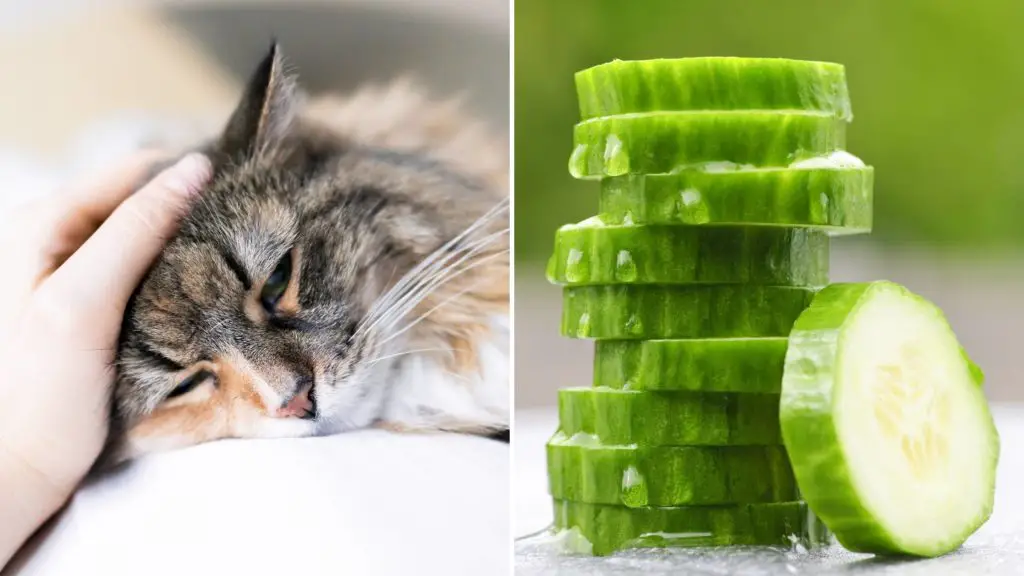
What other foods should you never feed your cat?
Some foods that you have lying around your home should never come into contact with, or be consumed by your feline friend. These include:
Onions and garlic: these cupboard essentials can damage your cat’s red blood cells and even lead to anemia. If eaten in large quantities, they can be poisonous to cats.
Milk: even though kitties enjoy drinking your milk, it isn’t good for them. The lactose in milk causes cats to have digestive problems, leading to a poorly tummy and diarrhea.
Chocolate: chocolate contains theobromine and caffeine which are both toxic to cats and can be fatal, even if only a small amount is consumed. Symptoms of chocolate poisoning in cats include restlessness, diarrhea, vomiting, increased breathing and heart rate, high temperature and seizures.
Grapes and raisins: a small amount of grapes or raisins can quickly lead to the development of kidney failure. Symptoms such as vomiting can occur within 12 hours, while other symptoms such as lethargy, reduced appetite and diarrhea can take up to 24 hours to show.
If your cat comes into contact with or consumes even a tiny amount of the items above, contact your veterinarian immediately.
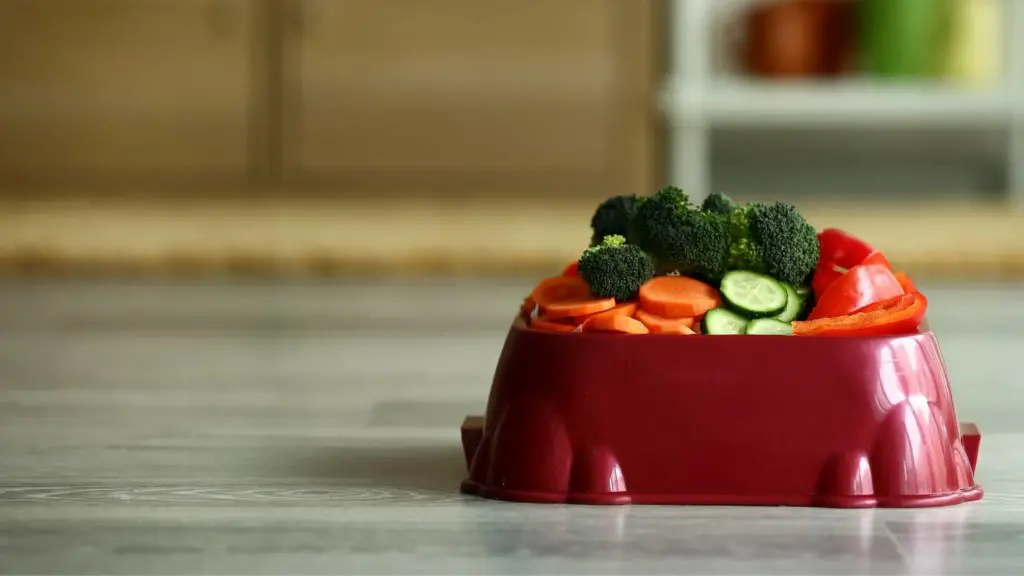
Cats and cucumbers
To conclude, cucumbers can be beneficial to cats in small quantities. Just remember to peel the skin first to remove any harmful pesticides.
Before introducing any new food to your pet’s diet, you should consult your veterinarian.
Reference list
- Reader’s Digest “Why are cats afraid of cucumbers”, https://www.rd.com/article/why-cats-afraid-of-cucumbers/, Accessed May 24th 2021
- Pets WEBMD “Foods cats can eat”, https://pets.webmd.com/cats/ss/slideshow-people-foods-cats-can-eat, Accessed May 24th 2021
- Avondale Animal Hospital “safe fruits and vegetables for cats”, https://www.avondaleanimal.com/blog/safe-fruits-vegetables-pet.html, Accessed May 24th 2021
- Battersea “How to reduce cats stress”, https://www.battersea.org.uk/pet-advice/cat-care-advice/reducing-your-cats-stress, Accessed May 24th 2021
- Battersea “Toxic items for cats”, https://www.battersea.org.uk/pet-advice/cat-care-advice/toxic-items-cats?gclid=Cj0KCQjwna2FBhDPARIsACAEc_VJZweiQfqS8cBO4oWbdK7K6SHctgqHOoteqyEXYF0ymPsXVJKmu5MaAhJMEALw_wcB, Accessed May 24th 2021
- Hillspet “Toxic food for cats”, https://www.hillspet.co.uk/cat-care/nutrition-feeding/toxic-foods-for-cats, Accessed May 24th 2021

